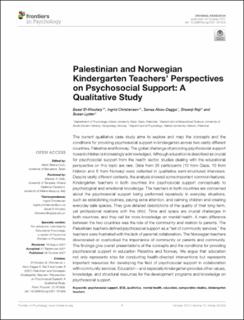| dc.contributor.author | El-Khodary, Basel | |
| dc.contributor.author | Christensen, Ingrid | |
| dc.contributor.author | Abou-Dagga, Sanaa | |
| dc.contributor.author | Raji, Shawqi | |
| dc.contributor.author | Lyden, Susan C. | |
| dc.date.accessioned | 2022-03-17T10:47:47Z | |
| dc.date.available | 2022-03-17T10:47:47Z | |
| dc.date.created | 2022-03-16T11:40:08Z | |
| dc.date.issued | 2021 | |
| dc.identifier.citation | El-Khodary, B., Christensen, I., Abou-Dagga, S., Raji, S. & Lyden, S. (2021). Palestinian and Norwegian Kindergarten Teachers' Perspectives on Psychosocial Support: A Qualitative Study. Frontiers in Psychology, 12, Artikkel 761303. | en_US |
| dc.identifier.issn | 1664-1078 | |
| dc.identifier.uri | https://hdl.handle.net/11250/2985786 | |
| dc.description.abstract | The current qualitative case study aims to explore and map the concepts and the conditions for providing psychosocial support in kindergarten across two vastly different countries, Palestine and Norway. The global challenge of providing psychosocial support toward children is increasingly acknowledged. Although education is described as crucial for psychosocial support from the health sector, studies dealing with the educational perspective on this topic are rare. Data from 26 participants (10 from Gaza, 10 from Hebron and 6 from Norway) were collected in qualitative semi-structured interviews. Despite vastly different contexts, the analysis showed some important common features. Kindergarten teachers in both countries link psychosocial support conceptually to psychological and emotional knowledge. The teachers in both countries are concerned about the psychosocial support being performed repeatedly in everyday situations, such as establishing routines, paying extra attention, and calming children and creating everyday safe spaces. They give detailed descriptions of the quality of their long-term, yet professional relations with the child. Time and space are crucial challenges in both countries, and they call for more knowledge on mental health. A main difference between the two countries was the role of the community and relation to parents. The Palestinian teachers defined psychosocial support as a “set of community services,” the teachers were frustrated with the lack of parental collaboration. The Norwegian teachers downscaled or overlooked the importance of community or parents and community. The findings give overall presentations of the concepts and the conditions for providing psychosocial support in education Palestine and Norway. We argue that education not only represents sites for conducting health-directed interventions but represents important resources for developing the field of psychosocial support in collaboration with community services. Education – and especially kindergarten provides other values, knowledge, and structural resources for the development programs and knowledge on psychosocial support. | en_US |
| dc.language.iso | eng | en_US |
| dc.rights | Navngivelse 4.0 Internasjonal | * |
| dc.rights.uri | http://creativecommons.org/licenses/by/4.0/deed.no | * |
| dc.title | Palestinian and Norwegian Kindergarten Teachers' Perspectives on Psychosocial Support: A Qualitative Study | en_US |
| dc.type | Peer reviewed | en_US |
| dc.type | Journal article | en_US |
| dc.description.version | publishedVersion | en_US |
| dc.rights.holder | © 2021 El-Khodary, Christensen, Abou-Dagga, Raji and Lyden. | en_US |
| dc.source.volume | 12 | en_US |
| dc.source.journal | Frontiers in Psychology | en_US |
| dc.identifier.doi | https://doi.org/10.3389/fpsyg.2021.761303 | |
| dc.identifier.cristin | 2010183 | |
| dc.source.articlenumber | 761303 | en_US |
| cristin.ispublished | true | |
| cristin.fulltext | original | |
| cristin.qualitycode | 1 | |

